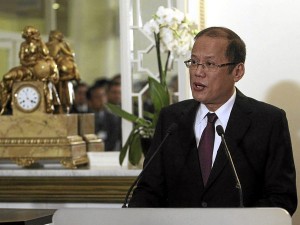Aquino stands by UN arbitration of dispute with China

President Benigno Aquino addresses the World Economic Forum in Davos, Switzerland. Malacañang Photo Bureau
DAVOS, Switzerland—President Benigno Aquino stood firm on the Philippines’ decision to seek United Nations arbitration of its territorial dispute with China, saying this action was backed by a consensus among the three branches of government.
In a chat with Philippine journalists on the sidelines of the World Economic Forum annual meeting, Aquino shrugged off concerns that taking the arbitration route would complicate gas exploration activities in the West Philippine Sea, as the Manila government calls part of the South China Sea that it claims to be part of Philippine territory.
Aquino was specifically asked about the concern aired by businessman Manuel V. Pangilinan, chair of Philex Petroleum Corp. which is in talks with the state-owned China National Offshore Oil Corp. (CNOOC) on Recto Bank gas exploration subject to a framework acceptable to both the Philippine and Chinese governments.
In the first place, Aquino said, the partnership offer of CNOOC to Pangilinan’s group was still at a very early stage.
Secondly, the President said, the Philippines had justifiable reasons to take the arbitration route given recurring incidents of intrusion by Chinese vessels into Philippine seas. The President cited two separate maritime incidents in Bajo de Masinloc. ‘
Based on affidavits shown to him, the President said, two Chinese vessels were just about 10 yards away from the demarcation line.
“And when you’re talking about ships, they don’t have brakes, right? Ten yards is just too close. While they were approaching, their horns were at full blast,” Mr. Aquino said.
On incident No. 2, the allegation of the affiant was that while sheltering inside Bajo de Masinloc, they were “observed,” and eventually approached and ordered out of the shoal when they were taking shelter from rough waters, the President said.
Citing the affidavit, the President said the Filipino vessels were told to go back to the rough waters even as Bajo de Masinloc, under UNCLOS (United Nations Convention on the Law of the Sea), was part of of the country’s exclusive economic zone .
“So I think the record is very clear. From the incident in Bajo de Masinloc, we have tried to de-escalate the situation. We have tried to adhere to all of their request…. And instead of a de-escalation, there seems to be an escalation on their end,” the President said.
“With all due respect to Mr. Pangilinan, what am I supposed to do? I consulted the leadership of both chambers of Houses, both chambers, to include the minority leadership of both and (they were) okay,” he said.
Before taking this route, Mr. Aquino said the Executive branch invited the judiciary, which unfortunately was in an en banc session on the day a meeting was called on the issue.
The President said even past presidents like Fidel V. Ramos and Joseph Estrada were invited to share their experiences. “So we brought the matter before them and there was unanimity. I won’t exaggerate, but really, nobody objected to going into this arbitration mode. I think, the choice is very, very clear,” Aquino said.
One option for the Philippines is to let the status quo remain whereas China was claiming effective control over Bajo de Masinloc and ordering Philippine vessels out.
“And if we don’t do this approach then, what is the next step? Is it Reed Bank next or Recto Bank? What else? We’ve been, I think, very patient. We believe we’ve been complying with the request in the interest of maintaining good relations but unfortunately, there has been no reciprocation. Hence, I am, by workings of the Constitution, and by the oath that I undertook, I swore to defend this country, and we are doing this under international law, in a peaceful manner” he said.
Aquino said the Philippines was not trying to threaten anybody. “But if we don’t stand up for our rights, who we do expect will be standing up for our rights?” he said.
But Pangilinan, in a statement, aired what he said was a very practical and moral question: “Are you prepared to set aside, but not surrender, your claim on sovereignty over the area, so you could go on and develop the area jointly or should you stick to the moral position that this is ours and no matter what happens this is ours? In which case, quite likely, it will never be developed, at least not in our lifetime.”
For comprehensive coverage, in-depth analysis, visit our special page for West Philippine Sea updates. Stay informed with articles, videos, and expert opinions.